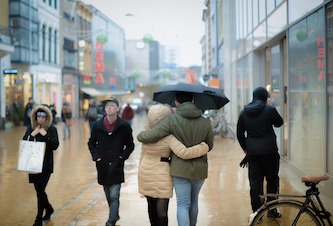Last month, the UK had a lot of rain, and it affected how much people went shopping. The British Retail Consortium said that there was 5.7% less people going to High Streets, retail parks, and shopping centers compared to last year. People also felt pressure from the cost of living, which made them less confident about spending a lot of money.
The CEO of the BRC, Helen Dickinson, said that the rainy weather and Storm Babet stopped people from going out to shop. When they did go, they bought more things at once. Dickinson said that the retail market is uncertain, and people are being careful about spending money because of the cost of living.
The next few months are really important for shops because of Christmas and Black Friday. Andy Sumpter from Sensormatic Solutions said that shops need to focus on keeping customers happy and selling things online to make the most of this time.
The BRC data showed that Yorkshire and the Humber had the biggest drop in people going shopping, with 10.2% less than last year. In cities, Leeds had the biggest drop, and only Edinburgh had more people going shopping. This data shows how hard it is for shops to deal with the economy and how people are shopping.
Original news source: Rain hits shops ahead of key Christmas season (BBC)
Listen
Slow
Normal
Fast
Group or Classroom Activities
Warm-up Activities:
– News Reporter Role-play
Instructions: Students will be divided into pairs. One student plays the role of a news reporter, while the other takes on the character of the CEO of the British Retail Consortium, Helen Dickinson. The reporter will interview the CEO about the impact of the rain on shopping behavior and the strategies the shops are implementing for the upcoming Christmas and Black Friday. Encourage the use of direct quotes from the article and improvisation to expand the dialogue.
– Opinion Poll
Instructions: Write a series of statements on the board related to the article, such as “Rain significantly affects shopping habits” or “Online shopping will become more important for retail success.” Students will stand on a line in the classroom representing an ‘opinion spectrum’ from ‘strongly agree’ to ‘strongly disagree.’ They will position themselves along the line according to their opinions on each statement. Afterward, they can discuss their positions in small groups.
– Vocabulary Pictionary
Instructions: Select key vocabulary from the article (e.g., retail, consortium, cost of living, uncertain market, consumer confidence). Write each word on an individual slip of paper. Students will take turns drawing the word they pick for their team to guess. The team has a minute to guess the vocabulary word based on the drawing, without any verbal clues.
– Synonym Challenge
Instructions: Prepare a list of words from the article (e.g., affected, confident, uncertain, important, focus). Students will work in small groups to come up with as many synonyms as they can for each word within a set time limit. They can then compare their lists with other groups and discuss any new words they learned.
– Future Predictions
Instructions: Students will use the information from the article to make predictions about the future of shopping and retail in the UK. They can consider questions like “Will the trend of decreased High Street shopping continue?” or “How might retailers adapt to the changing market conditions?” Students can write down their predictions and then share them with the class. This activity should encourage the use of future tenses and conditional structures.
Comprehension Questions:
1. What was the percentage decrease in the number of people going to High Streets, retail parks, and shopping centers compared to last year?
2. How did the weather last month impact the shopping behavior of people in the UK?
3. What did Helen Dickinson, the CEO of the BRC, mention as a reason for people buying more items in fewer trips?
4. Why are the next few months considered crucial for shops according to Andy Sumpter?
5. What strategy did Andy Sumpter suggest for shops to maximize their sales in the coming months?
6. Which region experienced the largest decline in shopper numbers, and what was the percentage of this decrease?
7. Among the cities mentioned, which one saw the greatest reduction in shoppers, and which city had an increase?
8. Based on the article, what are two major factors that are influencing how people in the UK are spending their money?
Go to answers ⇩
Listen and Fill in the Gaps:
Last month, the UK had a lot of rain, and it affected how much (1)______ went shopping. The British Retail Consortium said that there was 5.7% less people going to High Streets, retail (2)______, and shopping centers compared to last year. (3)______ also felt pressure from the cost of (4)______, which made them less confident about spending a lot of money.
The CEO of the BRC, Helen Dickinson, said that the (5)______ weather and Storm (6)______ stopped people from going out to shop. When they did go, they bought more things at once. Dickinson said that the retail (7)______ is uncertain, and people are being (8)______ about spending money because of the cost of living.
The next few (9)______ are really important for (10)______ because of (11)______ and Black Friday. Andy Sumpter from Sensormatic Solutions said that shops need to focus on keeping customers happy and selling (12)______ online to make the most of this time.
The BRC data showed that Yorkshire and the (13)______ had the (14)______ drop in people going (15)______, with 10.2% less than last year. In cities, Leeds had the biggest drop, and only Edinburgh had more people going shopping. This data (16)______ how hard it is for shops to deal with the economy and how people are shopping.
Go to answers ⇩
Discussion Questions:
Students can ask a partner these questions, or discuss them as a group.
1. What is your favorite place to shop and why?
2. How would you feel if your local shopping area had fewer people visiting?
3. Do you like shopping online or in-store better? Why?
4. Have you ever decided not to go shopping because of bad weather? Can you tell about that experience?
5. What do you think makes shopping a pleasant experience?
6. How does the weather affect your daily activities, like shopping?
7. When you hear about a decrease in shoppers, what do you think might be the cause?
8. Do you think holidays like Christmas and Black Friday are important for shops? Why or why not?
9. Have you noticed any changes in how much things cost recently? How has that affected you?
10. What is a ‘retail park’? Have you ever been to one?
11. If you were a shop owner, how would you try to keep customers happy?
12. Do you think the cost of living influences how you spend money? In what way?
13. What is a ‘High Street’? Is there something similar in your country?
14. Have you ever shopped less because you were worried about money? What was that like?
15. What do you think could be done to make more people go shopping in physical stores?
Individual Activities
Vocabulary Meanings:
Match each word to its meaning.
Words:
1. affected
2. pressure
3. confident
4. uncertain
5. focus
6. drop
7. economy
8. deal
Meanings:
(a) Changed or influenced in some way
(b) Not sure or not definite
(c) The system of producing, selling, and buying goods and services
(d) A decrease or reduction in something
(e) To handle or manage a situation or problem
(f) Believing in one’s abilities or decisions
(g) Feeling stressed or burdened by something
(h) Paying attention to something and making it a priority
Go to answers ⇩
Multiple Choice Questions:
1. According to the article, what was the reason for less people going shopping in the UK last month?
(a) High prices of goods
(b) Lack of interest in shopping
(c) Rainy weather and Storm Babet
(d) Traffic jams in the city
2. Who mentioned that the next few months are important for shops because of Christmas and Black Friday?
(a) Helen Dickinson
(b) The British Retail Consortium
(c) Sensormatic Solutions
(d) Andy Sumpter
3. According to the article, which region in the UK had the biggest drop in people going shopping?
(a) Yorkshire and the Humber
(b) London
(c) South East England
(d) North West England
4. What did people do when they did go shopping, according to the article?
(a) Spent less money
(b) Bought more things at once
(c) Only bought essential items
(d) Avoided shopping in the rain
5. Who felt pressure from the cost of living, making them less confident about spending money?
(a) People in the UK
(b) Shop owners
(c) The British Retail Consortium
(d) Sensormatic Solutions
6. According to the article, what did Andy Sumpter suggest shops should focus on during the upcoming months?
(a) Reducing prices to attract more customers
(b) Opening more physical stores
(c) Advertising on social media
(d) Keeping customers happy and selling things online
7. Which city had the biggest drop in people going shopping, according to the article?
(a) Edinburgh
(b) Manchester
(c) Leeds
(d) Birmingham
8. Who mentioned that the retail market is uncertain and people are being careful about spending money?
(a) Andy Sumpter
(b) Helen Dickinson
(c) The British Retail Consortium
(d) Sensormatic Solutions
Go to answers ⇩
True or False Questions:
1. When people did go shopping, they bought fewer things at once.
2. Yorkshire and the Humber had the biggest drop in people going shopping, with 10.2% less than last year.
3. The next few months are important for shops because of Christmas and Black Friday.
4. The British Retail Consortium reported a 5.7% decrease in people going to High Streets, retail parks, and shopping centers.
5. People felt pressure from the cost of living, which made them less confident about spending money.
6. Last month, the UK had very little rain, which made more people go shopping compared to last year.
7. The retail market is certain, and people are not being careful about spending money because of the cost of living.
8. The CEO of the BRC, Helen Dickinson, said that the sunny weather and Storm Babet stopped people from going out to shop.
Go to answers ⇩
Write a Summary:
Write a summary of this news article in two sentences.
Check your writing now with the best free AI for English writing!
Writing Questions:
Answer the following questions. Write as much as you can for each answer.
Check your answers with our free English writing assistant!
1. Why did fewer people go shopping in the UK last month?
2. What two factors did Helen Dickinson, the CEO of the BRC, mention that affected shopping habits?
3. Why are the next few months considered crucial for retail shops?
4. According to the article, what strategy should shops adopt to improve their sales?
5. Which area in the UK experienced the largest decline in shopper numbers, and how much did it decrease?
Answers
Comprehension Question Answers:
1. What was the percentage decrease in the number of people going to High Streets, retail parks, and shopping centers compared to last year?
The percentage decrease was 5.7%.
2. How did the weather last month impact the shopping behavior of people in the UK?
The rainy weather and Storm Babet caused fewer people to go out to shop.
3. What did Helen Dickinson, the CEO of the BRC, mention as a reason for people buying more items in fewer trips?
Helen Dickinson mentioned that people bought more items in fewer trips because they were trying to avoid the bad weather and also because they’re worried about spending too much due to the cost of living.
4. Why are the next few months considered crucial for shops according to Andy Sumpter?
The next few months are crucial for shops because of big shopping events like Christmas and Black Friday.
5. What strategy did Andy Sumpter suggest for shops to maximize their sales in the coming months?
Andy Sumpter suggested that shops should focus on keeping customers happy and also improve their online sales to maximize profits during the important shopping period.
6. Which region experienced the largest decline in shopper numbers, and what was the percentage of this decrease?
Yorkshire and the Humber experienced the largest decline, with a 10.2% decrease in shopper numbers.
7. Among the cities mentioned, which one saw the greatest reduction in shoppers, and which city had an increase?
Leeds saw the greatest reduction in shoppers, while Edinburgh was the only city mentioned that had an increase in shopper numbers.
8. Based on the article, what are two major factors that are influencing how people in the UK are spending their money?
The two major factors are the weather, particularly the rain and storms, and the cost of living pressures that are making people more cautious about their spending.
Go back to questions ⇧
Listen and Fill in the Gaps Answers:
(1) people
(2) parks
(3) People
(4) living
(5) rainy
(6) Babet
(7) market
(8) careful
(9) months
(10) shops
(11) Christmas
(12) things
(13) Humber
(14) biggest
(15) shopping
(16) shows
Go back to questions ⇧
Vocabulary Meanings Answers:
1. affected
Answer: (a) Changed or influenced in some way
2. pressure
Answer: (g) Feeling stressed or burdened by something
3. confident
Answer: (f) Believing in one’s abilities or decisions
4. uncertain
Answer: (b) Not sure or not definite
5. focus
Answer: (h) Paying attention to something and making it a priority
6. drop
Answer: (d) A decrease or reduction in something
7. economy
Answer: (c) The system of producing, selling, and buying goods and services
8. deal
Answer: (e) To handle or manage a situation or problem
Go back to questions ⇧
Multiple Choice Answers:
1. According to the article, what was the reason for less people going shopping in the UK last month?
Answer: (c) Rainy weather and Storm Babet
2. Who mentioned that the next few months are important for shops because of Christmas and Black Friday?
Answer: (d) Andy Sumpter
3. According to the article, which region in the UK had the biggest drop in people going shopping?
Answer: (a) Yorkshire and the Humber
4. What did people do when they did go shopping, according to the article?
Answer: (b) Bought more things at once
5. Who felt pressure from the cost of living, making them less confident about spending money?
Answer: (a) People in the UK
6. According to the article, what did Andy Sumpter suggest shops should focus on during the upcoming months?
Answer: (d) Keeping customers happy and selling things online
7. Which city had the biggest drop in people going shopping, according to the article?
Answer: (c) Leeds
8. Who mentioned that the retail market is uncertain and people are being careful about spending money?
Answer: (b) Helen Dickinson
Go back to questions ⇧
True or False Answers:
1. When people did go shopping, they bought fewer things at once. (Answer: False)
2. Yorkshire and the Humber had the biggest drop in people going shopping, with 10.2% less than last year. (Answer: True)
3. The next few months are important for shops because of Christmas and Black Friday. (Answer: True)
4. The British Retail Consortium reported a 5.7% decrease in people going to High Streets, retail parks, and shopping centers. (Answer: True)
5. People felt pressure from the cost of living, which made them less confident about spending money. (Answer: True)
6. Last month, the UK had very little rain, which made more people go shopping compared to last year. (Answer: False)
7. The retail market is certain, and people are not being careful about spending money because of the cost of living. (Answer: False)
8. The CEO of the BRC, Helen Dickinson, said that the sunny weather and Storm Babet stopped people from going out to shop. (Answer: False)
Go back to questions ⇧















